Symbolizing courage and determination, the Dachshund dog breed has long been admired for its unique appearance and unwavering loyalty. Originating from Germany, these dogs were bred with a purpose – to hunt small game with their distinctive elongated bodies and powerful sense of smell.
But there is more to this breed than meets the eye. From their versatile nature to their endearing nicknames, Dachshunds have captured the hearts of many.
So, whether you're considering adopting or purchasing a Dachshund, or simply curious about their fascinating characteristics, this article will provide you with a wealth of information and insights, leaving you eager to discover the world of these remarkable dogs.
Key Takeaways
- Dachshunds are a versatile breed, suitable for various roles such as family companionship, show dogs, and small-game hunting.
- When getting a Dachshund puppy, it is important to choose the right coat type and consider their exercise and grooming needs.
- It is recommended to adopt Dachshunds from rescue organizations or shelters, but if purchasing a puppy, it is crucial to choose a reputable breeder that prioritizes the dog's health and well-being.
- Dachshunds are originally from Germany and come in three different sizes and coat types, with a lively and curious temperament.
Bred for Hunting Small Game
Dachshunds were specifically bred for their exceptional hunting abilities, making them highly skilled in tracking and capturing small game such as badgers, rabbits, and foxes. Their long, low bodies and powerful legs allow them to maneuver through underground tunnels and dense vegetation with ease.
With their keen sense of smell and tenacious nature, Dachshunds excel in locating and flushing out prey. Their small size also enables them to access tight spaces where larger hunting dogs can't reach. Dachshunds were bred to work independently, making them resourceful and persistent hunters.
Their ability to work both above and below ground has made them valuable assets in hunting various types of game. Today, while many Dachshunds no longer participate in hunting, their natural instincts and skills are still evident in their behavior and characteristics.
Versatile Breed for Various Purposes
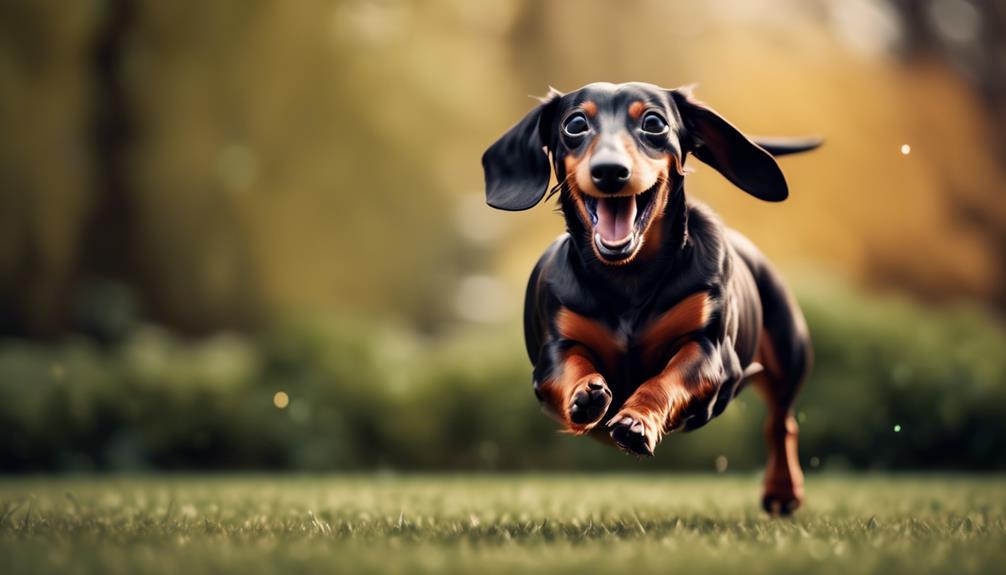
With their exceptional hunting abilities and resourcefulness, Dachshunds have proven to be a versatile breed that excels in various purposes beyond their original hunting capabilities. While they were initially bred for hunting small game like badgers, rabbits, and foxes, Dachshunds have adapted to become excellent family companions, show dogs, and even therapy dogs.
Their small size, intelligence, and affectionate nature make them ideal for households of all sizes. Additionally, their keen sense of smell and determination make them excellent candidates for search and rescue work and tracking. Dachshunds have also been successful in various dog sports such as agility, obedience, and scent work.
Their versatility makes them a beloved breed for many different purposes, showcasing their adaptability and unique skills.
Popular Nicknames for Dachshunds
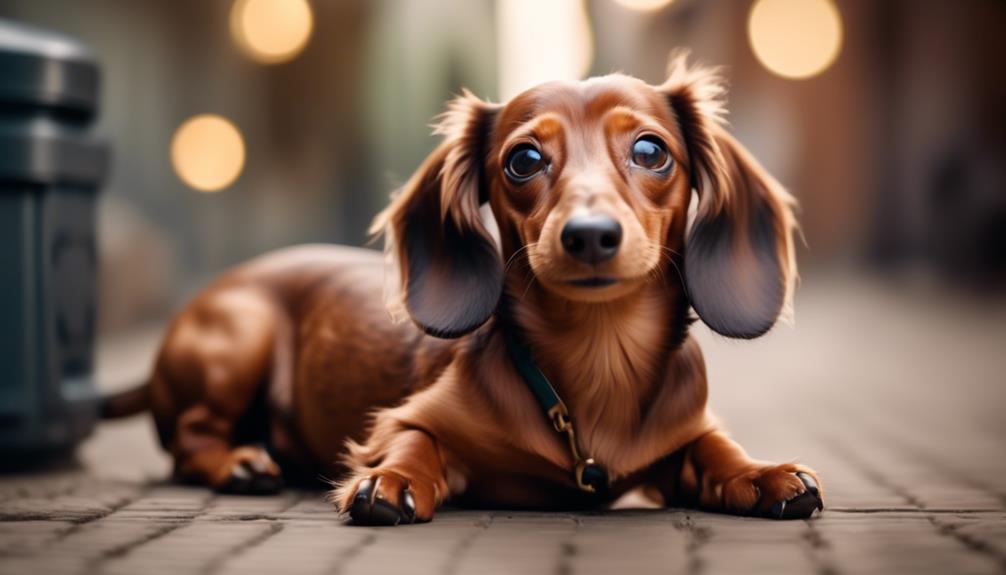
Dachshunds, known for their unique elongated bodies and spirited personalities, have garnered a variety of popular nicknames that reflect their distinctive characteristics. These nicknames not only add charm to the breed, but also highlight their physical attributes and playful nature. Here are some of the most popular nicknames for Dachshunds:
| Nickname | Description |
|---|---|
| Wiener Dog | Derived from their sausage-like appearance, this nickname pays homage to their elongated bodies. |
| Sausage Dog | Similar to the Wiener Dog, this nickname emphasizes their elongated shape and is often used affectionately. |
| Doxie | A shortened version of Dachshund, this nickname is commonly used by owners and enthusiasts to refer to their beloved pets. |
These nicknames have become widely recognized and serve as endearing terms for Dachshunds. Whether you prefer the playful and whimsical "Wiener Dog" or the more affectionate "Doxie," these nicknames capture the essence of this beloved breed.
Adoption and Purchasing Considerations

When considering adoption or purchasing a Dachshund, it's important to carefully evaluate your options and make informed decisions based on ethical practices and the well-being of the dog. Here are three key considerations to keep in mind:
- Adoption from rescue organizations or shelters: Prioritize adopting a Dachshund from a rescue organization or shelter. By adopting, you give a loving home to a dog in need and support the efforts of these organizations.
- Choosing a reputable breeder: If purchasing a Dachshund puppy, it's crucial to choose a reputable breeder. Research breeders thoroughly to ensure they prioritize the health and temperament of their dogs. Reputable breeders conduct health screenings, provide a nurturing environment, and follow proper breeding standards.
- Avoiding unethical practices: To promote responsible breeding, it's essential to avoid supporting unethical practices. Ensure the breeder provides necessary documentation and follows proper breeding standards. By supporting responsible breeders, you contribute to the well-being of Dachshunds and help prevent the perpetuation of harmful breeding practices.
Facts About Dachshund Puppies
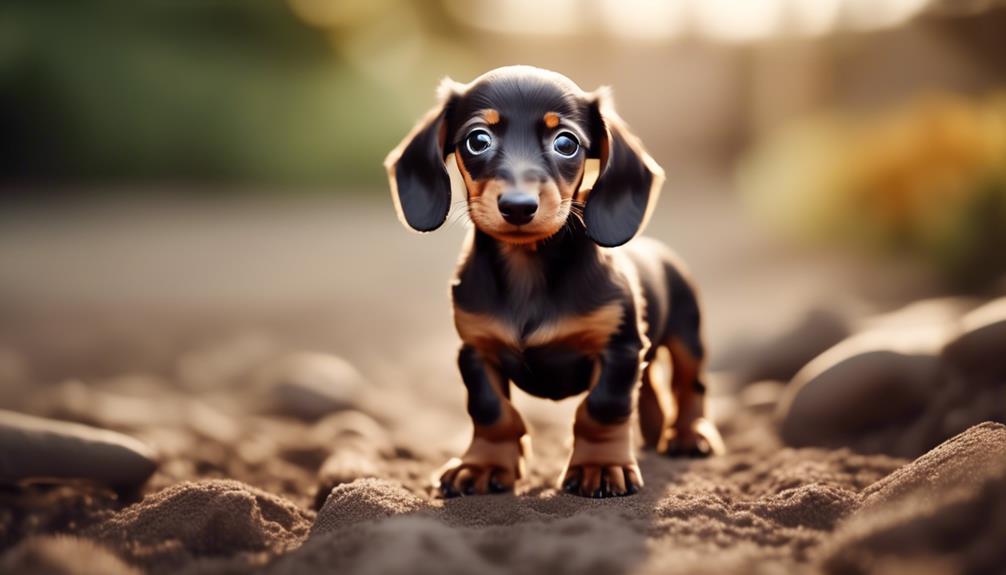
Dachshund puppies, known for their adorable appearance and playful nature, are available in three coat types: shorthaired, longhaired, and wirehaired.
Each coat type has its own unique characteristics and grooming needs. Shorthaired Dachshund puppies have a sleek and smooth coat that requires minimal grooming.
Longhaired Dachshund puppies have a flowing and elegant coat that requires regular brushing to prevent matting.
Wirehaired Dachshund puppies have a coarse and wiry coat that also requires regular brushing and occasional hand-stripping to maintain its texture.
It's important to note that all Dachshund puppies, regardless of coat type, require proper socialization and training to ensure they grow up to be well-behaved and balanced adults.
Different Coat Types of Dachshund Puppies
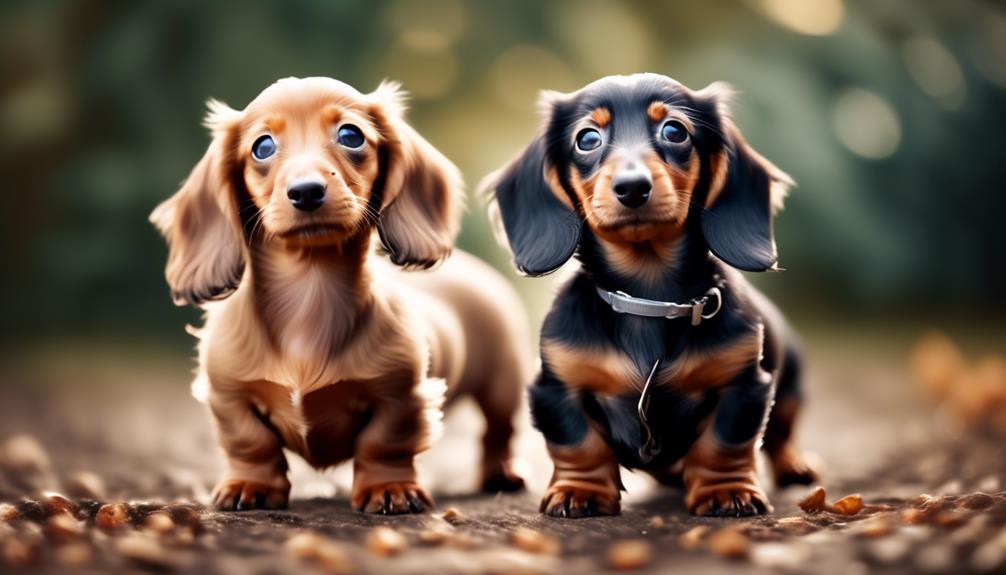
There are three distinct coat types to choose from when considering a Dachshund puppy: shorthaired, longhaired, and wirehaired. Each coat type has its own unique characteristics and grooming needs.
- Shorthaired: The shorthaired Dachshund has a smooth and sleek coat that lies close to the body. This type of coat requires minimal grooming, with occasional brushing to remove loose hairs. Shorthaired Dachshunds are known for their low maintenance and easy-care coats.
- Longhaired: The longhaired Dachshund has a soft and flowing coat that requires more regular grooming. Their coat is longer and may require brushing several times a week to prevent matting and tangles. Longhaired Dachshunds are known for their elegant appearance and silky coats.
- Wirehaired: The wirehaired Dachshund has a dense and wiry coat that provides extra protection from rough terrain. This type of coat requires regular hand-stripping or trimming to maintain its texture and shape. Wirehaired Dachshunds are known for their rugged and unique coats.
When choosing a Dachshund puppy, consider the coat type that best suits your preferences and lifestyle.
Exercise and Training for Dachshund Puppies
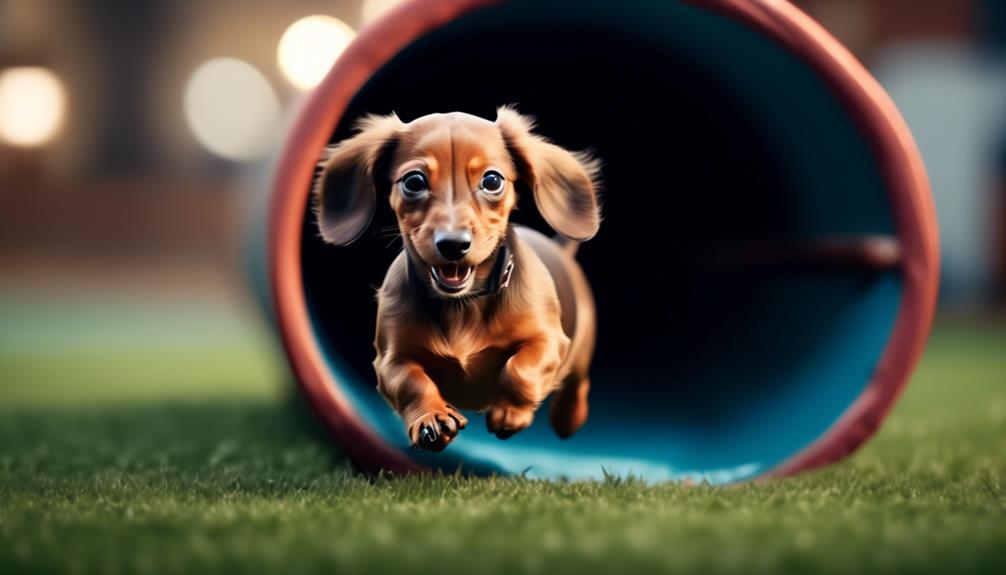
Are you wondering how to properly exercise and train your Dachshund puppy to ensure their physical and mental well-being? Dachshunds are an active breed that requires regular exercise to prevent obesity and keep them mentally stimulated. It is important to start training your Dachshund puppy from a young age to establish good behavior and obedience. Positive reinforcement training methods work best for this intelligent and eager-to-please breed. A structured exercise routine, along with mental stimulation through training and interactive toys, will help keep your Dachshund happy and healthy. Below is a table that provides some guidelines for exercise and training for Dachshund puppies:
| Exercise | Training |
|---|---|
| Daily walks or play sessions in a secure area | Basic obedience training, including commands like sit, stay, and come |
| Games that involve chasing and retrieving toys | Potty training and crate training |
| Puzzle toys and treat-dispensing toys for mental stimulation | Socialization with other dogs and people |
| Agility training to fulfill their natural instincts | Leash training for walks |
| Supervised playtime with other dogs for socialization | Trick training for mental stimulation |
Remember to consult with your veterinarian or a professional dog trainer for personalized advice on exercise and training for your Dachshund puppy.
Grooming Needs Based on Coat Type
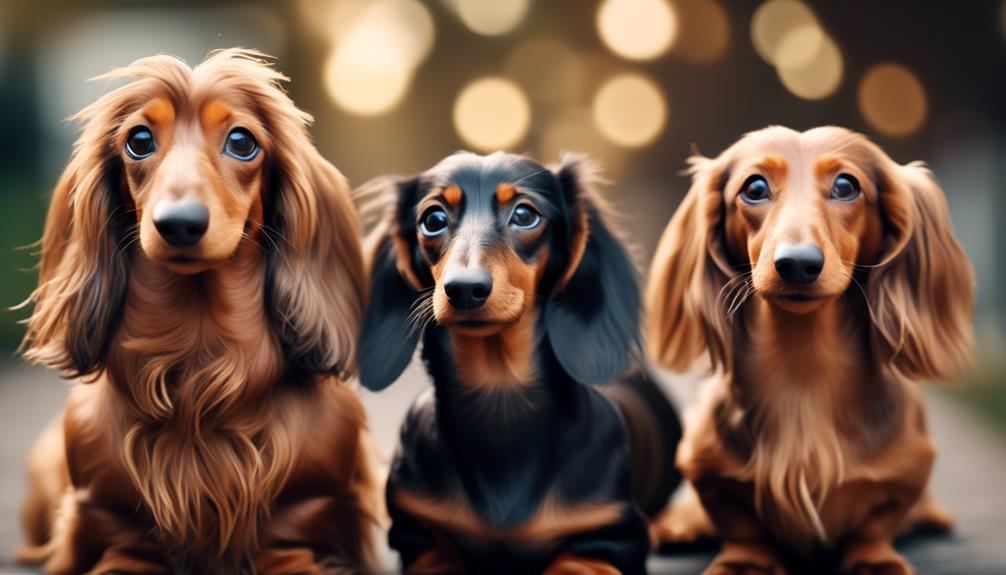
To ensure your Dachshund puppy's grooming needs are met, it's important to understand how to care for their coat based on its specific type. Here are three key considerations for grooming Dachshunds based on their coat type:
- Shorthaired Dachshunds:
Shorthaired Dachshunds have a sleek and smooth coat that requires minimal grooming. Regular brushing with a soft bristle brush will help remove loose hair and maintain their coat's shine. Occasional baths are recommended to keep them clean and fresh.
- Longhaired Dachshunds:
Longhaired Dachshunds have a more luxurious and flowing coat that requires more attention. Regular brushing is essential to prevent matting and tangles. Pay extra attention to their ears, as longhaired Dachshunds are prone to ear infections. Regular baths and occasional trims are also necessary to keep their coat looking its best.
- Wirehaired Dachshunds:
Wirehaired Dachshunds have a rough and wiry coat that requires special care. Regular hand-stripping or professional grooming is recommended to maintain their coat's texture and color. Brushing should be done regularly to remove loose hair and prevent matting. Occasional baths with a mild shampoo are necessary to keep their coat clean and healthy.
Suitable Dog Names for Dachshunds

Choosing a suitable dog name for your Dachshund is an important decision that reflects their unique personality and characteristics. To help you find the perfect name, here are some suggestions inspired by their appearance, personality, or German heritage:
| Male Names | Female Names |
|---|---|
| Oscar | Daisy |
| Fritz | Lola |
| Bruno | Bella |
| Max | Lucy |
When choosing a name, consider its pronunciation and ease of use. It should be a name that you and your Dachshund are comfortable with and can easily respond to. Remember, your Dachshund's name will be with them for life, so take the time to find a name that truly suits them.
Naming Considerations for Dachshunds
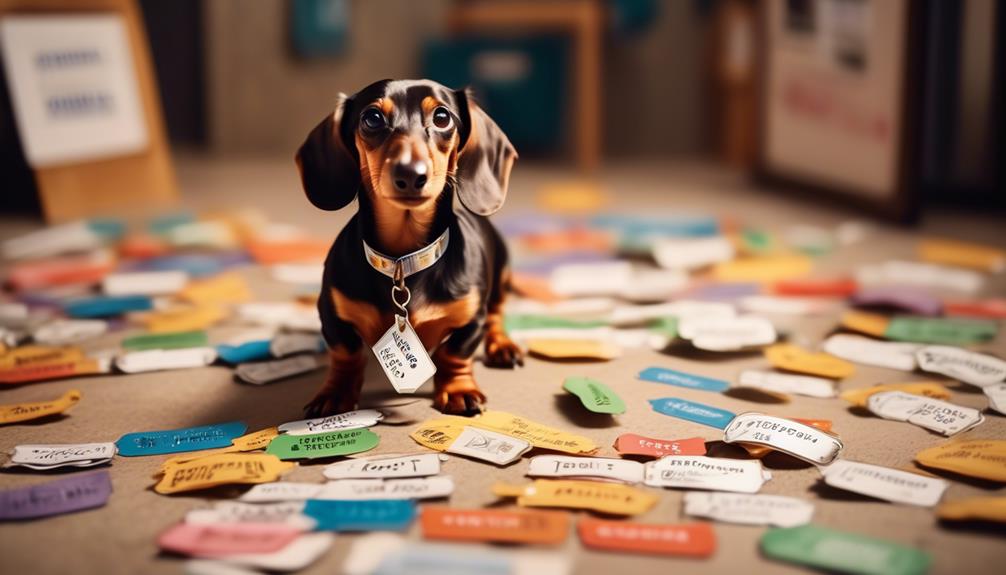
When considering names for your Dachshund, it's important to take into account their unique characteristics and the ease of use and pronunciation of the chosen name. Here are some naming considerations to keep in mind:
- Reflect their appearance or personality: Dachshunds are known for their long bodies and short legs, so names like 'Slinky' or 'Stubby' can be fitting. Alternatively, you can choose a name that reflects their bold and fearless nature, such as 'Braveheart' or 'Fearless'.
- Pay homage to their German heritage: Dachshunds originated from Germany, so choosing a German-inspired name can be a nod to their roots. Consider names like 'Greta', 'Hans', or 'Kaiser'.
- Consider ease of use and pronunciation: Dachshunds are smart, but they can also be stubborn. Choose a name that's easy to say and that your Dachshund will respond to. Avoid names that sound too similar to common commands or other family members' names.
Importance of Choosing a Reputable Breeder

After considering suitable names for your Dachshund, it's crucial to understand the importance of selecting a reputable breeder.
Choosing a reputable breeder ensures that you're getting a healthy and well-socialized puppy. A reputable breeder prioritizes the health and temperament of their dogs, conducting necessary health screenings and providing a nurturing environment for the puppies.
They follow proper breeding standards and provide the necessary documentation, such as health records and pedigree papers. By supporting responsible breeders, you're also helping to avoid unethical breeding practices, such as puppy mills or backyard breeders.
Researching breeders and asking for recommendations can help you find a reputable breeder who genuinely cares about the well-being of their dogs and the puppies they produce.
Researching and Evaluating Breeders

To ensure the well-being of your future Dachshund puppy, it's essential to thoroughly research and evaluate breeders. Here are three important steps to consider:
- Gather Information:
- Start by gathering information about different breeders.
- Look for breeders who have a good reputation and positive reviews from previous customers.
- Check if they are registered with reputable kennel clubs or breed organizations.
- Research their breeding practices, including health testing for genetic diseases and the socialization methods they use.
- Ask Questions:
- Once you have identified potential breeders, reach out to them and ask specific questions about their breeding program.
- Inquire about the health history of the parent dogs, the living conditions of the puppies, and the socialization experiences they provide.
- A responsible breeder will be transparent and willing to answer your questions.
- Visit the Breeder:
- If possible, schedule a visit to the breeder's facility.
- Observe the living conditions of the dogs and puppies, ensuring they are clean and well-cared for.
- Pay attention to the temperament of the parent dogs, as it can be an indicator of the puppies' future behavior.
- A reputable breeder will welcome your visit and allow you to interact with the dogs.
Characteristics and Care of Dachshunds

After thoroughly researching and evaluating breeders, it's important to understand the characteristics and care required for Dachshunds, a versatile and lively dog breed.
Originating from Germany, Dachshunds come in three sizes: Standard, Miniature, and Kaninchen. With a lifespan of about 12-16 years, they've three coat types: Shorthaired, Longhaired, and Wirehaired.
Despite their small size, Dachshunds have a lively and curious temperament, often displaying cleverness and bravery. These dogs require regular exercise to prevent obesity and mental stimulation to keep them engaged.
Grooming needs vary depending on the coat type, with the Wirehaired variety needing more attention. Additionally, Dachshunds thrive on positive reinforcement training and benefit from early socialization.
Proper care, including a balanced diet, regular vet check-ups, and dental care, is essential to ensure their overall health and well-being.
Frequently Asked Questions
Are Dachshunds Good With Children and Other Pets?
Yes, Dachshunds are generally good with children and other pets. They have a lively and curious temperament, which makes them playful and friendly. However, it is important to supervise interactions and teach children how to properly handle and respect dogs.
What Are Some Common Health Issues That Dachshunds May Experience?
Dachshunds are prone to health issues such as intervertebral disc disease, obesity, and dental problems. Regular exercise, a balanced diet, and routine veterinary care can help prevent and manage these conditions.
How Much Exercise Do Dachshunds Need on a Daily Basis?
Dachshunds require daily exercise to maintain their overall health and prevent obesity. A combination of walks, playtime, and mental stimulation is necessary. The specific amount of exercise depends on factors such as age, size, and individual energy levels.
Can Dachshunds Be Left Alone for Long Periods of Time?
Dachshunds should not be left alone for long periods of time as they are social dogs and thrive on human companionship. They may become anxious or develop behavioral issues if left alone for extended periods.
Do Dachshunds Have Any Specific Dietary Requirements or Restrictions?
Dachshunds don't have any specific dietary requirements or restrictions, but it's important to provide them with a balanced diet that meets their nutritional needs. Consult a veterinarian to determine the appropriate food and portion sizes for your Dachshund.
What are the characteristics and traits of a Dachshund that are also present in a Dachsador mixed breed?
The dachsador mixed dog breed inherits the loyal and affectionate traits of the Dachshund. Known for their playful nature and high energy levels, these mixed breeds also share the Dachshund’s hunting instincts and intelligence. With their unique blend of characteristics, dachsadors make loving and energetic companions.
Conclusion
In conclusion, the Dachshund is a remarkable breed that has evolved from its hunting origins to become a beloved companion and show dog. Whether adopting from a rescue organization or purchasing from a reputable breeder, it's crucial to prioritize the well-being of these unique dogs.
By understanding the characteristics and care needs of Dachshunds, potential owners can provide them with a fulfilling and happy life. Remember, a Dachshund's loyalty and affection are as boundless as their long bodies, making them a wonderful addition to any family.




